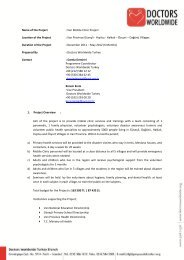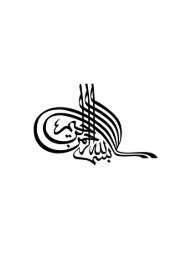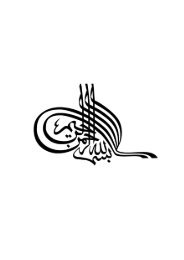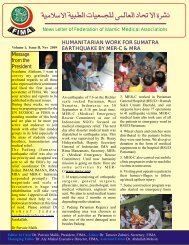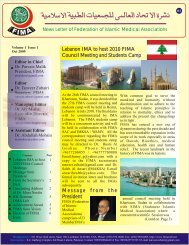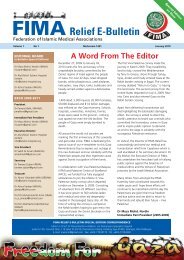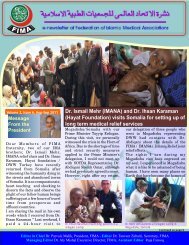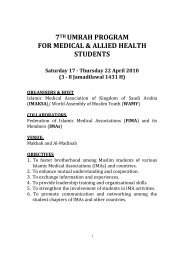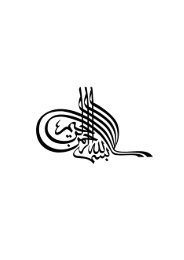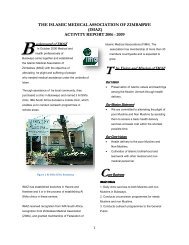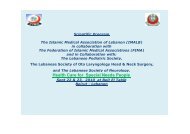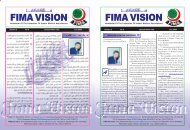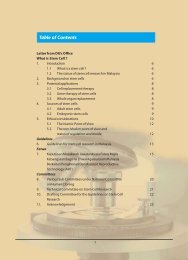FIMA Year Book 2009 - Federation of Islamic Medical Associations
FIMA Year Book 2009 - Federation of Islamic Medical Associations
FIMA Year Book 2009 - Federation of Islamic Medical Associations
You also want an ePaper? Increase the reach of your titles
YUMPU automatically turns print PDFs into web optimized ePapers that Google loves.
Quality Assurance and AccreditationIn <strong>Medical</strong> Education: An <strong>Islamic</strong> PerspectiveMohammad Iqbal Khan*, and Anis AhmedAbstract:Quality control in higher education has become an essential part <strong>of</strong> the educational processat all levels. Most <strong>of</strong> the educational objectives can be quantified and standardized usingquality assurance mechanisms. Market forces and globalization’ are the reasons for theincreasing emphasis on the concept <strong>of</strong> quality and its impact on the providers <strong>of</strong> educationprograms. There is increasing need to understand quality assurance and different modalities<strong>of</strong> quality control. In higher education, hybridization <strong>of</strong> two or three quality control models isrequired to address the most important issues <strong>of</strong> learning. Quality control demands the crispapplication <strong>of</strong> tools which must assess and quantify all three basic domains <strong>of</strong> learning i.e.cognitive, psychomotor and effective domains. Based on these studies a quality managementstrategy is designed for every program. Based on quality management studies, a qualityassurance process is designed which is a continuous process and is frequently modifiedaccording to the emerging situations. A quality culture needs to assure quality controlmechanisms at all levels. It must address the requirements <strong>of</strong> infrastructure, services, humanresources, selection <strong>of</strong> students, curriculum, instructional strategies, assessment system,research quality, graduates’ as well as alumni’s performance, student reporting system,academic counsel and faculty development. Benchmarks have become essential tools toimprove the overall look <strong>of</strong> the institution. <strong>Islamic</strong> perspectives and concepts <strong>of</strong> excellence(ihsan) have been greatly emphasized in the Qur’an and the tradition (Sunnah) <strong>of</strong> ProphetMuhammad (PBUH). Work ethics, responsibility, accountability, sense <strong>of</strong> being answerable,not only in this life, but also in the hereafter and rewards <strong>of</strong> proper performance with utmosteffort and best manners makes a believer strives for the best. Responsibilities need to bebestowed according to the best available abilities to achieve the best possible results. On thebasis <strong>of</strong> Qur’anic teachings and the traditions <strong>of</strong> the Prophet (PBUH), certain criteria arededuced which every Muslim medical educationist must acquire to achieve and maintain therequired quality assurance in medical education.Keywords: Quality control, quality assurance, medical education, accreditation, Ihsan,excellence, <strong>Islamic</strong> perspectives.*Mohammad Iqbal KhanMD; FRCS (Eng); FRCS; (Glasg.)Pr<strong>of</strong>essor and head <strong>of</strong> the Department <strong>of</strong> Surgery<strong>Islamic</strong> International <strong>Medical</strong> CollegeRiphah International University Islamabad- PakistanE-mail: mikhandr@gmail.com<strong>FIMA</strong> <strong>Year</strong><strong>Book</strong> <strong>2009</strong>155




